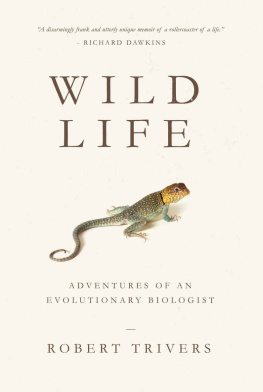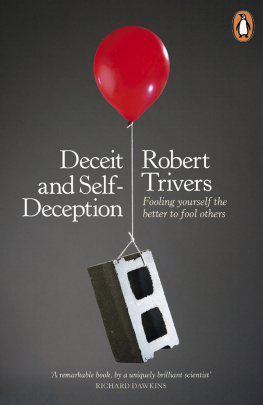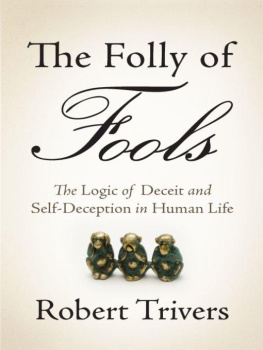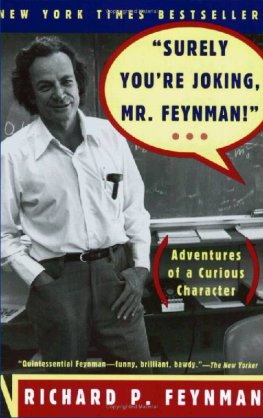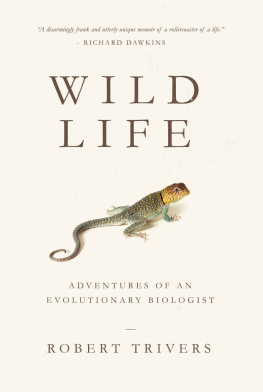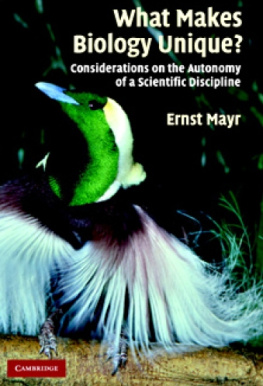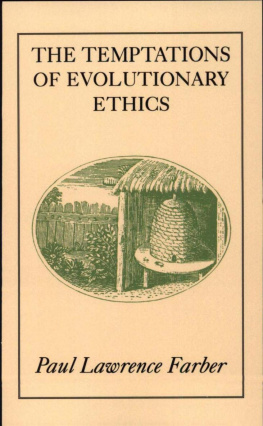WILD LIFE
Adventures of an Evolutionary Biologist Robert Trivers
Biosocial Research
New Brunswick, New Jersey
In memory of my teacher
William H. Drury, Jr. Contents Preface
Studying Life and Living It
For a scientist there is always studying life and living it, and I have never wanted the one to overwhelm the other. Yet that is exactly what a life devoted to science will tempt you into a life of studying and, otherwise, not much living. Yes, you may have a family and a few good friends, but most scientists embrace a sedentary life, often solitary and intensely internal. You concentrate on experiments and theory and perpetual reading. Your small area of study is the focus of your life, and it is a focus you share with only a few others. Of course, that is not to say you dont have your chances for exciting social interaction. Deep in the bowels of Harvards Museum of Comparative Zoology, with row after row of specimens along long, dark corridors, occasionally a beetle specialist turns, grabs a gall midge freak, and for one wild moment there is both socio-sexual congress and a melding of lives based on biology itself. He will study beetles, she gall midges, side by side around the world. No competition, only complementation.
But this kind of life never appealed to me. I was an out-breeder, certainly by nature, and I was also raised in a diplomats home. Foreign countries and languages were part of my upbringing. Since my father served in Europe, I had walked through more cathedrals, museums and art galleries than were healthy for any child, and I had no interest whatsoever in European culture, nor in the academic disciplines based on them. But I did know five foreign languages and enjoyed meeting people in their own land, speaking their language, learning about their area of expertise.
When I finally found my intellectual home in evolutionary biology, it offered me exactly the right kind of foreign travel in the rural, the bush, the exotic, and the wild. Third world, not first. Evolutionary biology would take me around the world. And it would show me how to carve knowledge from everything I experienced in these travels with a single, very general logic what would natural selection favor? How would one best survive and reproduce in these conditions? In short, I signed on to a system of thought that allowed me to study life and live it, sometimes very intensively.
I was twenty-two when I learned evolutionary logic, twenty-three when I began studying birds seriously, and twenty-four when I headed on my first trip to the wild. I was single and male. I was eager to see what lay abroad. My biology teacher was an arctic man so that is where I first went. But I did so only once. I knew the moment I left the arctic that I was never coming back too cold, too harsh, too little life, and, yes, probably too limited a social life. Next time, I knew, I was going south. As it turned out, I was going to Jamaica, where I have now lived for eighteen years of my life.
I have also studied wildlife (and human life) in Haiti, India, Kenya, Tanzania, Panama, Barbados, and Senegal. But it is Jamaica that has, in some sense, been every bit as much my intellectual home as is evolutionary biology. I both joined the island (acquired land) and stole women off the island as the Jamaican expression goes. My five children are American/Jamaican. I could easily have gone the West African route, as many evolutionary biologists of the era did. I have often wondered how different my lifes trajectory would have been if I had. Certainly, going the Jamaican route did not shield me from exposure to violence.
In evolutionary terms, violence is associated with large, immediate effects on survival. Jamaica, in turn, is a violent society. Of course, I didn't know this when I made the decision to first do my fieldwork there. In fact, I was surprised to meet a German sociologist in 1970 who was studying violence in Jamaica. I thought, wow, a German is willing to travel all this distance to study violence? Must be something interesting going on. He was incredulous. Did I not know that Jamaica was one of the most dangerous societies in the world? News to me. But Jamaica, he assured me, had one of the highest murder rates in the world per capita. It still does.
I think it is fair to say that my decades of fieldwork, especially in Jamaica but also in Panama (and even Amsterdam), have involved more near-death experiences than that of most scientists. I have been involved in robberies at gunpoint and at knifepoint, an armed home invasion, and a fight that led to my being charged with assault. I have also nearly catapulted myself off of heights too great to ensure survival. You might call me unlucky, but I prefer to say that the scimitar of natural selection has often been raised high above my head. In the pages that follow, I have tried to capture this unusual dimension of my experiences where living life and studying it have merged into one another under extreme conditions precisely those conditions expected to reveal the underlying dynamics of evolution most clearly.
My near-death experiences have made up one very important way in which I have managed not to forgo living life while studying it. But these pages contain much more than just the violent characters and episodes I have met with. I have also met extraordinary minds along the way, from my unheralded teacher Bill Drury, to the legendary evolutionist Ernst Mayr, to the Minister of Defense of the Black Panther Party, Huey P. Newton (both brilliant and dangerous), among numerous others. I have tried to give something here of the flavor of these extraordinary humans, and of what it meant to know them.
And finally I have tried to connect my life to members of other animal species, trying to understand them from the inside and even to talk to them in their own languages. In the pages that follow I have woven in, wherever relevant, these distant but often surprisingly familiar viewpoints and communications that of birds and monkeys, lizards and chimpanzees.
This mixture of recollections might strike some as strange. Near-death experiences. Great human minds. The minds and behaviors of other animals. To me, though, it is the only mixture of recollections that could give a sense of how I have lived life and studied it and of how these endeavors have so often become indistinguishable from one another. This is my life as an evolutionary biologist animals, fellow evolutionists, and near-death experiences all in one.
Chapter 1
From Mathematics to Viet Nam War Vet to Unemployed
When I was twelve years old I knew I wanted to be a scientist because it was obvious upon inspection (this was 1955) that none of the other intellectual areas history, religion, English literature or the social so-called sciences provided much hope of actual, sustained intellectual advance. I was at first attracted to astronomy, the vastness and beauty of space and the billions of years it had been forming. So much more exciting and awe-inspiring than the seven-day metaphor of the Bible. I got a telescope, read Hoyles standard Astronomy text and came up with the bi-stellar hypothesis for the origin of the solar system.
I liked that astronomy was a science. These people were not fooling around. They measured things and they did so carefully. They tested assertions against data, and were capable of changing either, and they continually attempted to improve the precision of their measurements. When Einsteins theory that gravity bent light was tested by the apparent change in position of a star during an eclipse we had dramatic evidence, measured with great precision, of exactly how much that bend was. But astronomy was not a discipline you could pursue in the eighth grade, so I soon turned to mathematics.
My father happened to have a large number of math books and out of sheer boredom one day I picked out one entitled Differential Calculus. I was thirteen and it took me two months to master the book. It then took me two more to master the book next to it, Integral Calculus. It was a thrill to see that the algebra I knew could generate fields with real predictive and analytic power it was now trivial to measure the area under a complex curve. That was only part of the beauty of mathematics, and its scientific twin: you could learn the whole thing from the bottom up. That is, if you were willing to put in the time and the effort. Mathematical proofs were entirely explicit, every variable and every transformation exactly described. Scientific experiments, in turn, were described so others could attempt to replicate them exactly to see if duplicate results were achieved.
Next page
